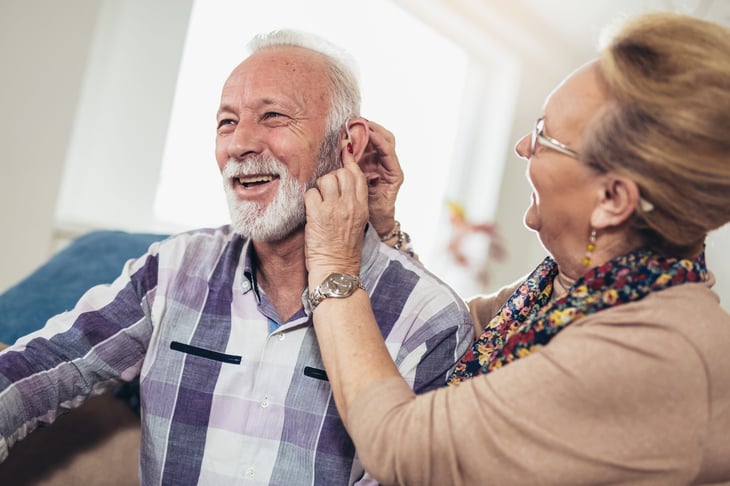
Editor's Note: This story originally appeared on The Penny Hoarder.
Affording hearing aids is challenging if you’re an older American on Medicare.
That’s because Original Medicare — which covers a majority of beneficiaries — doesn’t cover hearing aids, fittings or hearing exams.
That’s right — not a dime. And hearing aids are expensive: The average cost for one pair ranges from $3,000 to $6,000.
About 1 in 3 people between the ages of 65 and 74 have hearing loss, and nearly half of people 75 and older have difficulty hearing, according to the National Institute on Aging.
For now, older adults are mostly on the hook when it comes to paying for hearing care.
In this guide, we break down what hearing aid coverage is available to both Original Medicare and Medicare Advantage beneficiaries.
We also explore other ways to save money on hearing care, including Medicaid and nonprofit programs.
Does Medicare Cover Hearing Aids and Exams?

Original Medicare doesn’t cover hearing aids or exams for fitting hearing aids. Some Medicare Advantage plans have hearing aid coverage, but it varies by plan. Some other services are covered under both, however.
Original Medicare

In some situations, Original Medicare coverage may pay for cochlear implants or hearing tests in emergency situations.
Original Medicare covers 80% of the cost of cochlear implants for those who qualify. Cochlear implants are considered medically necessary for the treatment of a severe to profound hearing impairment.
Medicare Part B will generally cover a cochlear implant if you recognize sentences while wearing your hearing aids only 40% of the time or less.
Medicare Part B will also cover 80% of a diagnostic hearing test and balance exams, but only if it is ordered by your doctor or health care provider during an emergency.
For example, a doctor may run these tests to diagnose the cause of dizziness or vertigo.
Medicare Advantage

Original Medicare doesn’t provide hearing aid coverage, but many Medicare Advantage plans offer hearing health benefits.
Medicare Advantage plans are administered by private insurance companies. They must provide the same basic coverage as Original Medicare, but plans may offer additional benefits, such as hearing aids.
About 93% of Medicare Advantage plans provided some hearing aid coverage in 2021, according to the Kaiser Family Foundation.
But how much coverage each Medicare Advantage plan provides varies.
For example, the KFF analysis found that about 60% of enrollees are in plans that require cost sharing for hearing aids, which ranged from $5 up to $3,355 in 2021.
Most plans also include coverage limits and restrict you to a specific network of physicians.
Make sure you calculate your potential out-of-pocket costs when choosing a Medicare Advantage plan.
Remember: Even with a good Medicare Advantage plan, you may still face out-of-pocket costs, such as premiums and deductibles as well as copayments to see an audiologist for fittings.
6 Ways To Get Cheap Hearing Aids
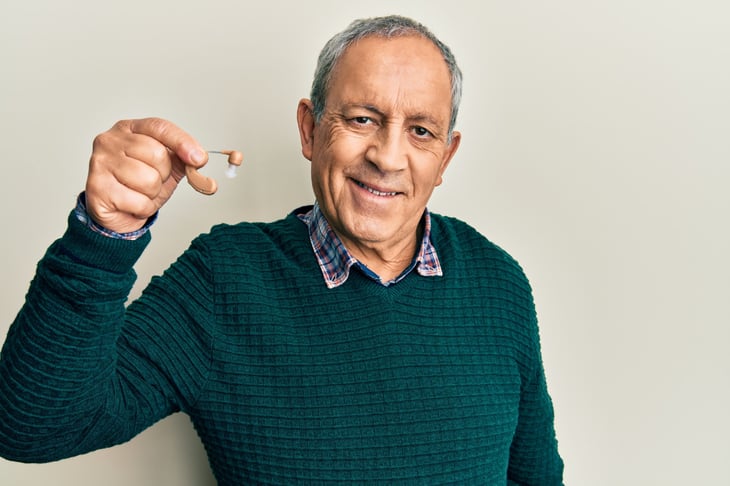
Medicare beneficiaries who accessed hearing care services spent an average of $914 out of pocket in 2018, according to an analysis by the Kaiser Family Foundation. For many, that’s simply out of reach.
Some national organizations cover hearing aids for people with low incomes and limited resources. These programs often have strict eligibility criteria and may be difficult to qualify for.
There are other ways to get affordable hearing aids, including shopping around and asking your audiologist for sliding-scale payment options.
1. Miracle-Ear Foundation’s Gift of Sound Program
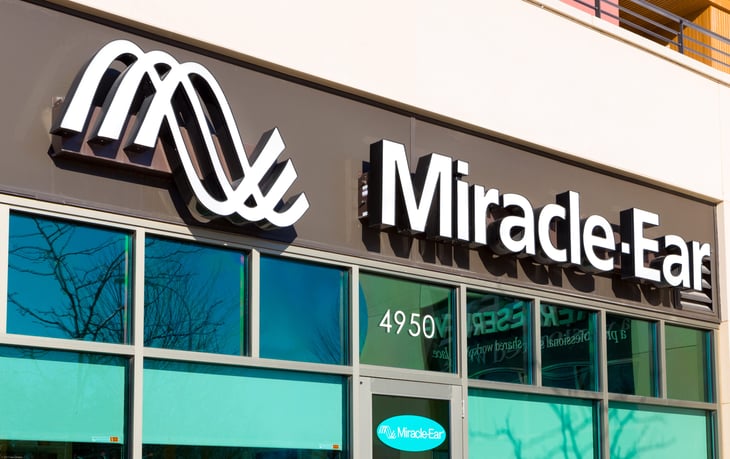
The Miracle-Ear Foundation’s Gift of Sound program helps provide hearing aids for adults with hearing loss.
The program is available to individuals with significantly limited incomes under 200% of the federal poverty level who have exhausted all other financial resources.
You need to contact your local Miracle-Ear store before starting an application. Supporting documentation from a hearing care professional and an application fee of $150 is required.
You can find more information about the Gift of Sound program along with eligibility requirements here.
2. Help America Hear Program
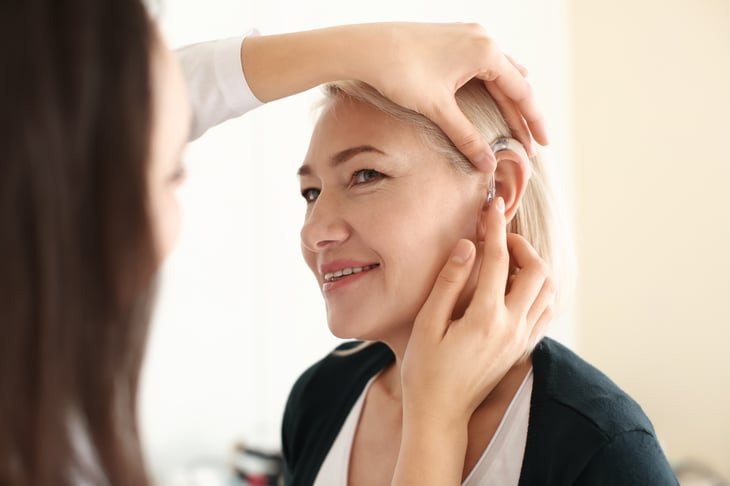
The Help America Hear program provides hearing aids for adults with limited financial resources.
The program can provide both new ReSound behind-the-ear and receiver-in-canal digital hearing aids.
There are three qualifying tiers based on gross household income, personal assets and health insurance coverage.
Every applicant is required to pay a fee, which can range from $125 to $500 for one hearing aid, to $250 to $1,000 for two hearing aids.
The application process is extensive and requires medical documentation, proof of income and proof of health insurance (if any).
The entire application process can take two to six months, according to the organization’s website.
If you qualify, you are still responsible for the cost of the hearing evaluation, batteries, accessories as well as extended loss and damage warranties.
Click here to check out the Help America Hear program application.
3. Check Out Costco
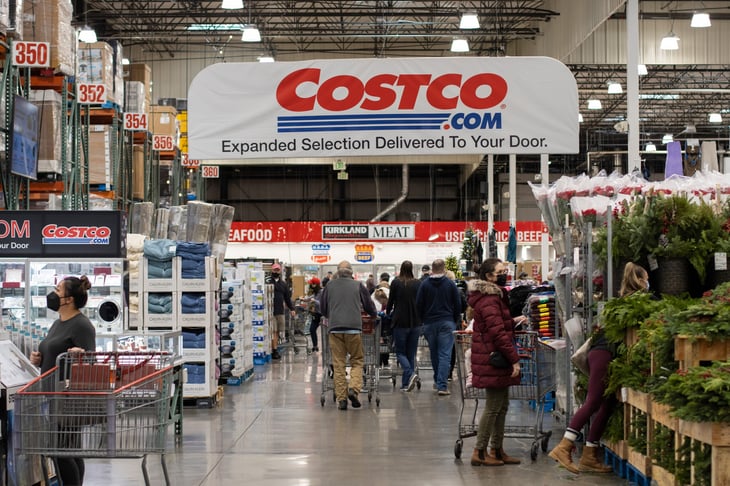
Comparison shopping is important if you want to save money on hearing aids.
Wholesale clubs like Costco offer great deals on hearing exams, fittings and devices.
Costco’s private brand, Kirkland Signature, sells hearing aids for about $1,400 per pair — about half the price you’d pay elsewhere for a name-brand equivalent. They also offer free hearing tests.
Not every Costco location has on-site audiologists or hearing specialists and you’ll need an appointment. You’ll also need to sign up for a Costco membership, which starts at $60 a year.
4. Talk to Your Doctor

It never hurts to ask for a discount.
It may sound like a no-brainer, but simply asking your health care provider for a more affordable price can really help.
According to Consumer Reports, almost half of all hearing aid users in their survey who asked for a lower price on their hearing aids ultimately received a discount.
Most audiologists and hearing care professionals offer financing plans and some offer sliding-scale payment options.
Wherever you go to purchase your device, try bargaining or asking for a lower-priced model.
The price of a hearing aid is sometimes “bundled” to include the device plus other costs, like the audiologist’s services for fittings, adjustments and follow-up care.
Asking your provider to unbundle their services and provide you with an itemized list of charges can help you save money because you’ll only pay for what you need.
5. Keep an Eye Out For Over-the-Counter Hearing Aids

Hearing aids may get much more affordable in the near future thanks to an FDA proposed rule issued in October 2021.
The rule would create a new class of over-the-counter (OTC) hearing aids available without an exam or fitting by an audiologist.
OTC hearing aids would be available from any seller — and at a fraction of the cost. Consumers could pay about $600 per pair instead of upward of $5,000 per pair, according to Harvard Health Review.
It would also cut the red tape many consumers face: Currently, patients must see a licensed hearing professional and obtain a prescription before they can buy hearing aids.
OTC hearing aids will be available to adults with mild to moderate hearing loss, and will be equipped with the same basic technology as traditional hearing aids.
The FDA is currently finalizing its proposed rule. OTC hearing aids are expected to hit the market by the end of 2022, according to The New York Times.
Local Organizations and Programs

Some local and regional nonprofit programs provide financial assistance or discounted hearing aids to those who qualify.
You can call United Way’s 2-1-1 social services number or contact your local Area Agency on Aging to see what’s available.
To find the contact information for your local Area Agency on Aging, enter your ZIP code into the Eldercare Locator tool operated by the U.S. government.
Other Hearing Care Insurance

Medicare coverage for hearing aids may be limited but Medicaid and VA benefits can help pick up the cost if you qualify.
Keep reading to learn more about these options.
Medicaid
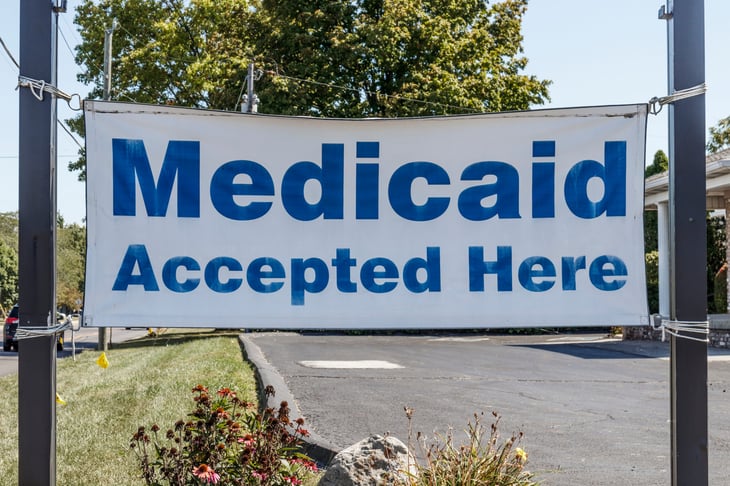
About one in five Medicare beneficiaries is also enrolled in Medicaid, sometimes referred to as being “dual enrolled.”
Medicaid is a government-funded health insurance program for people with low incomes. It’s administered at the state-level, so each state determines its own hearing benefits and limitations.
About half of states offer some hearing benefits and coverage for hearing aids.
What’s covered varies even among states with hearing aid benefits. In Florida, for example, you can receive a pair of hearing aids once every three years, but in North Dakota, Medicaid recipients are entitled to hearing aids only once every five years.
In some states, like New Jersey and Massachusetts, hearing aids are only available with specific Medicaid plans.
You can see what benefits your state offers along with any limitations and requirements by visiting this comprehensive list from the Hearing Loss Association of America.
Or call and ask the Medicaid program in your state to see if you qualify.
Veterans’ Benefits

Veterans may qualify for hearing aids through the U.S. Department of Veterans Affairs (VA).
You must enroll in the VA Health Benefits program to qualify.
Once enrolled (or if already enrolled), you can schedule an appointment at an Audiology and Speech Pathology Clinic for a hearing evaluation.
If the doctor recommends hearing aids, you can receive the devices for free so long as you maintain VA eligibility for care.
The VA will also provide necessary maintenance of any hearing aids you receive, including replacement batteries, cleaning and adjustments.
If you live more than 40 miles from a VA clinic or if you can’t get an appointment for at least a month, you may qualify to see a private audiologist through the VA’s Choice Program.
The VA provides hearing aids to the following veterans:
- Former Prisoners of War.
- Purple Heart recipients.
- Those rated permanently housebound or in need of routine care.
- Those with any service-related disability.
- Those with hearing loss resulting from a disease or medical condition for which they receive VA care or disability.
- Those who have hearing loss severe enough that it hinders their ability to participate in their own medical treatment or daily living.
Even if you don’t use the VA for your other health care needs, it’s smart to use it for hearing aids. It’s one of the only programs that provides high-quality devices at no cost.
To apply, visit your local VA office, go online or call 877-222-VETS (8387).





Add a Comment
Our Policy: We welcome relevant and respectful comments in order to foster healthy and informative discussions. All other comments may be removed. Comments with links are automatically held for moderation.